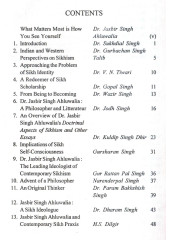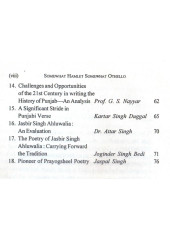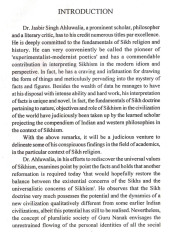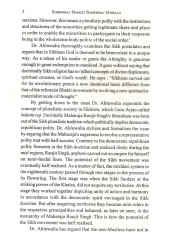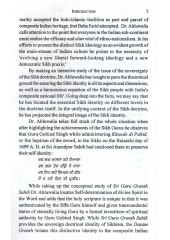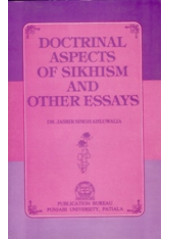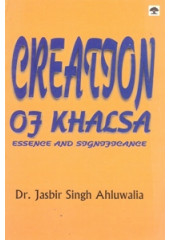Monday to Saturday - 10:00 Am to 9 PM
Now Enjoy Bulk Discounts on Books as Mentioned Below
These Discounts are in addition to the Discounts on Individual Books (Visible as Bulk Discount for Books in Cart)
Extra 10% Off If Books Purchased Exceeds Rs 3000 or 75 USD or 60 GBP or 60 Euro or 100 AUD or 100 CAD
Extra 15% Off If Books Purchased Exceeds Rs 6000 or 150 USD or 120 GBP or 120 Euro or 200 AUD or 200 CAD
Extra 20% Off If Books Purchased Exceeds Rs 15000 or 225 USD or 180 GBP or 180 Euro or 300 AUD or 300 CAD
Extra 25% Off If Books Purchased Exceeds Rs 30000 or 300 USD or 240 GBP or 240 Euro or 400 AUD or 400 CAD
Introduction To The Book 'Somewhat Hamlet Somewhat Othello' By Dr. Sukhdial Singh
INTRODUCTION
Dr. Jasbir Singh Ahluwalia, a prominent scholar, philosopher and a literary critic, has to his credit numerous titles par excellence. He is deeply committed to the fundamentals of Sikh religion and history. He can very conveniently be called the pioneer of 'experimentalist-modernist poetics' and has a commendable contribution in interpreting Sikhism in the modern idiom and perspective. In fact, he has a craving and infatuation for drawing the form of things and meticulusly pervading into the mystery of facts and figures. Besides the wealth of data he manages to have at his disposal with intense ability and hard work, his interpretation of facts is unique and novel. In fact, the fundamentals of Sikh doctrine pertaining to nature, objectives and role of Sikhism in the civilization of the world have judiciously been taken up by the learned scholar projecting the compendium of lndian and western philosophies in the context of Sikhism.
With the above remarks, it will be a judicious venture to delineate some of his conspicuous findings in the field of academics, in the particular context of Sikh religion.
Dr. Ahluwalia, in his efforts to rediscover the universal values of Sikhism, examines point by point the facts and holds that another reformation is required today 'that would hopefully restore the balance between the existential concerns of the Sikhs and the universalistic concerns of Sikhism'. He observes that the Sikh doctrine very much possesses the potential and the dynamics of a new civilization qualitatively different from some earlier Indian civilizations, albeit this potential has still to be realised. Nevertheless, the concept of pluralistic society of Guru Nanak envisages the unrestrained flowing of the personal identities of all the social sections. However, this means a pluralistic polity with the institutions and structures of the minorities getting legitimate share and place in order to enable the minorities to participate in their corporate being in the wholesome body politic of the social order.'
Dr. Ahluwalia thoroughly examines the Sikh postulates and argues that in Sikhism God is deemed to be benevolent in a unique way. As a token of his nadar or grace the Almighty is gracious enough to grant redemption to mankind. It goes without saying that doctrinally Sikh religion has no 'allied concepts of divine displeasure, spiritual censure, or God's wrath'. He says : "Sikhism carved out for its revolutionary praxis a new ideational basis different from that of the reformist Bhakti movement by evolving a new spiritualistmaterialist mode of thought."
By getting down to the issue Dr. Ahluwalia expounds the concept of pluralistic society in Sikhism, which Guru Arjan called halemi raj. Decidedly Maharaja Ranjit Singh's liberalism was born out of the Sikh pluralistic tradition which politically implies democratic republican polity. Dr. Ahluwalia stylizes and formalizes the issue by arguing that the Maharaja's eagerness to evolve a representative polity met with half success. Contrary to the democratic republican polity foreseen in the Sikh doctrine and realised dimly during the misl regime, Ranjit Singh, anyhow carved out an empire for himself on semi-feudal lines. The potential of the Sikh movement was eventually half realised. As a matter of fact, the misldari system in the eighteenth century passed through two stages in the process of its flowering. The first stage was when the Sikh Sardars or the striking power of the Khalsa, did not acquire any territories. At this stage they worked together depicting unity of action and harmony in accordance with the democratic spirit envisaged in the Sikh doctrine. But after acquiring territories they became mini rulers in the respective principalities and behaved, as later on seen, in the monarchy of Maharaja Ranjit Singh. This is how the potential of the Sikh movement was half realised.
Somewhat Hamlet Somewhat Othello - Book By Dr. Sukhdial Singh
- Brand: Gyan Sagar Publications
- Product Code: ESS304
- Availability: In Stock
-
Rs.100.00
Related Products
The Sovereignity of The Sikh Doctrine - Book By Jasbir Singh Ahluwalia
Table Of Contents For 'The Sovereignity of The Sikh Doctrine' Book By Jasbir Singh Ahluwalia &nbs..
Rs.350.00
Sikhism and 21st Century - Book By Jasbir Singh Ahluwalia
Preface To Book 'Sikhism and 21st Century' Book by Jasbir Singh Ahluwalia The creation ..
Rs.100.00
Doctrinal Aspects of Sikhism and Other Essays - Book By Dr. Jasbir Singh Ahluwalia
Foreword To Book 'Doctrinal Aspects of Sikhism and Other Essays' By Dr. Jasbir Singh Ahluwalia ..
Rs.180.00
Liberating Sikhism From The Sikhs - Sikhisms Potential For World Civilization - Book By Jasbir Singh Ahluwalia
Summary of 'Liberating Sikhism From The Sikhs , Sikhisms Potential For World Civilization' By Jasbir..
Rs.295.00
Creation of Khalsa - Essence And Significance - Book By Dr Jasbir Singh Ahluwalia
Summary of 'Creation of Khalsa , Essence And Significance' By Dr Jasbir Singh Ahluwalia ..
Rs.30.00
Insights Into Sikh Religion And History - Book By G.S.Dhillon
Introduction To 'Insights Into Sikh Religion And History' By G.S.Dhillon Sikhism which arose ..
Rs.200.00
Tags: book by dr. sukhdial singh, somewhat hamlet somewhat othello essays, punjabi, lekh


